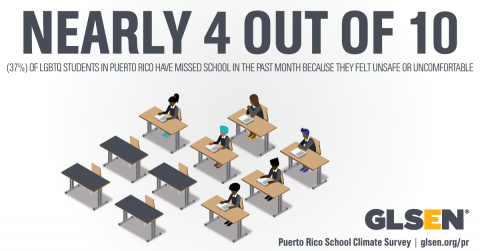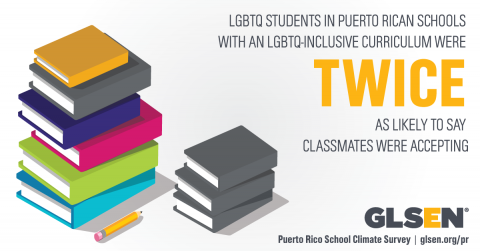
New Report Provides First Look at School Experiences of LGBTQ Youth in Puer
NEW: Puerto Rico School Climate Survey
For media inquiries or to arrange an interview with Noreen Giga, GLSEN Senior Research Associate, please contact:
Cathy Renna 917-757-6123 cathy@targetcue.com
New Report Provides First Look At School Experiences Of LGBTQ Youth In Puerto Rico
LGBTQ Students In Puerto Rico Report Hostile School Climate, But Supportive Resources Can Make A Difference
NEW YORK (August 31, 2017) – In response to growing local interest for Puerto Rico-specific data on the experiences of lesbian, gay, bisexual, transgender, and queer (LGBTQ) youth in middle and high schools, today GLSEN released their new report The Puerto Rico School Climate Survey (glsen.org/pr). This report provides the first-ever empirical data from LGBTQ youth on their school experiences in Puerto Rico.
For a distressing number of LGBTQ students in Puerto Rico, schools are hostile environments — the overwhelming majority of LGBTQ students routinely hear anti-LGBTQ language and experience victimization and discrimination at school. As a result, the majority of LGBTQ students in Puerto Rico felt unsafe at school because of their sexual orientation or gender expression (69% and 57%, respectively). When LGBTQ students feel unsafe or uncomfortable in school, it negatively affects students’ academic potential, with the majority of LGBTQ youth in Puerto Rico having avoided school activities (74% and 64%) and more than one third (37%) having missed school in the past month because they felt unsafe or uncomfortable.
“GLSEN’s research on LGBTQ youth experiences in Puerto Rico confirms what educators and LGBTQ youth have been saying for years: LGBTQ youth can’t learn in schools where harassment and discrimination are tolerated,” said Noreen Giga, GLSEN's Senior Research Associate. “It’s not surprising that the majority of LGBTQ students do not have an LGBTQ-inclusive curriculum in their school today, but it’s encouraging to see that students who do have inclusive curriculum are less likely to hear anti-LGBTQ remarks in their schools.”
Results from The Puerto Rico School Climate Survey demonstrate the ways in which school-based interventions — such as supportive staff, anti-bullying/harassment policies that enumerate sexual orientation, gender identity, and/or gender expression as protected categories, and curricular resources inclusive of LGBTQ people — can positively affect LGBTQ students’ school experiences in Puerto Rico. For example, compared to LGBTQ students with no supportive school staff, LGBTQ students with multiple supportive staff at their school were less likely to miss school because they felt unsafe or uncomfortable (24% vs. 63%). In addition, LGBTQ students in Puerto Rican schools with an LGBTQ-inclusive curriculum were more likely to say their classmates were accepting of LGBTQ people (67% vs. 31%).
“GLSEN’s Puerto Rico School Climate Survey provides further evidence that, similar to students in the 50 states and D.C., LGBTQ students in Puerto Rico report often feeling unsafe in school,” said Dr. Joseph Kosciw, GLSEN’s Chief Research & Strategy Officer. “There is an urgent need for action in order to create safe and supportive learning environments for LGBTQ students in Puerto Rico. Thankfully, results from both GLSEN’s Puerto Rico School Climate Survey and GLSEN’s National School Climate Survey demonstrate the ways in which school-based supports — such as supportive staff, enumerated anti-bullying/harassment policies, and curriculum inclusive of LGBTQ people — can positively affect LGBTQ students’ school experiences.”
GLSEN’s Puerto Rico School Climate Survey, which includes data from 211 students between the ages of 13 and 20 from all five regions in Puerto Rico, outlines the following recommendations based on the findings of the report:
- Adopt and implement enumerated anti-bullying/harassment policies that specifically enumerate sexual orientation, gender identity, and gender expression in individual schools, with clear and effective systems for reporting and addressing incidents that students experience;
- Provide professional development for school staff to improve rates of intervention in biased behaviors and increase the number of supportive teachers and other staff available to LGBTQ students;
- Ensure that school policies and practices, such as those related to dress codes and school dances, do not discriminate against LGBTQ students;
- Increase middle and high school student access to appropriate and accurate information regarding LGBTQ people, history, and events through inclusive curricula and library and Internet resources; and
- Support student clubs, such as Gay-Straight Alliances, and other school-wide programming that provide support for LGBTQ students, provide opportunities for student leadership development for LGBTQ students, and address LGBTQ issues in education.
Taken together, such measures can contribute to a future in which all students in Puerto Rico have the opportunity to learn and succeed in school, regardless of sexual orientation, gender identity, and/or gender expression.
The full report can be found at glsen.org/pr.
About the Puerto Rico School Climate Survey
Since 1999, GLSEN has been conducting the National School Climate Survey (NSCS) biennially in order to document the unique challenges LGBTQ students in the 50 states and DC face and identify interventions that can improve school climate. In the 2015 installment, we conducted the survey in Puerto Rico in response to a growing interest there in having empirical data on the school experiences of LGBTQ youth.
The Puerto Rico School Climate Survey was conducted online during the spring and summer of 2015. To obtain a diverse sample of LGBTQ youth attending middle or high school in Puerto Rico, we conducted outreach through local organizations that provide services to or advocate on behalf of LGBTQ youth, and advertised and promoted on social networking sites, such as Facebook. The final sample consisted of a total of 211 students between the ages of 13 and 20. Students were from all five regions in Puerto Rico. Slightly less than half of the sample (45%) was cisgender male, and over two-thirds identified as gay or lesbian (70%). Students in our sample were in grades 8 to 12 during the 2014-2015 school year, with the largest numbers in 12th grade.
About GLSEN
GLSEN creates safe and affirming K-12 schools for all students. We envision a world in which every child learns to respect and accept all people, regardless of sexual orientation, gender identity, and/or expression. Each year, GLSEN programs and resources reach tens of thousands of K-12 schools across the United States, and our network of community-led chapters brings GLSEN’s expertise to local communities. GLSEN's progress and impact have won support for our work at all levels of education in the United States and sparked an international movement to ensure equality for LGBTQ students and respect for all in schools. For more information on GLSEN’s policy advocacy, student leadership initiatives, public education, research and educator training programs, please visit glsen.org.
Infographics
The following graphics are available for media use, with attribution to GLSEN (www.glsen.org/pr).
Nearly 4 out of 10 (37%) of LGBTQ students in Puerto Rico have missed school in the past month because they felt unsafe or uncomfortable.
LGBTQ students in Puerto Rican schools with an LGBTQ-inclusive curriculum were twice as likely to say classmates were accepting.

